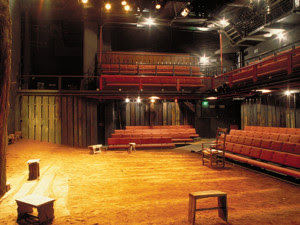Donmar Warehouse
Isabella Arbelaez
Isabella Arbelaez
The Donmar Warehouse is an intimate 251-seat, state-subsidized theater in Covent Garden, right at the heart
of London’s West End. It is internationally acknowledged as one of the world’s
principle producing theaters, having won numerous awards during its 24-year
history. The theatre’s artistic
policy is very diverse and it includes new writing, new versions of European
classics, the incorporation of both British and American drama, and small-scale
musical theatre.
Donald Albery, a theatrical producer, founded the company Donmar Productions around the year 1953.
When thinking of a name for the theater, Albery decided to use the first three
letters of his name and the first three letters of his wife's middle name,
Margaret. He purchased the warehouse in 1961, a building that had previously
been used as a hops warehouse for a local
brewery in the 1870s, and later as a film studio in the 1920s before becoming
the Covent Garden. His son Ian Albery, a producer and theatre design consultant, was
responsible for converting the warehouse into a private rehearsal studio. The
family owned the theater for about 16 years until it was purchased by the Royal
Shakespeare Company in 1977. The company changed the name of the theater back to
“The Warehouse,” and their next step was to renovate and equip it, which they
accomplished in a very short time frame. They had their first show, Schweik in the Second World War, on July
18th of that same year.
Under the ownership of the
Royal Shakespeare Company, each season at the Warehouse was exceptionally creative
and innovative. The company staged many popular productions, including Trevor
Nunn’s “Stratford 1976” Macbeth. Then
in 1990, Roger Wingate bought the theater from the Royal Shakespeare Company,
did a major renovation, and completely re-equipped it and turned it into the
place that is still maintained today. The theater had its grand opening in
1992, right after Sam Mendes was appointed as the theater’s first Artistic Director
by Wingate, who still is a board member and theatrical producer for Donmar
today.
Under the influence of Sam
Mendes, the Donmar Warehouse became an independent producing theater in 1992.
His grand opening and very first production was Stephen Sondheim’s Assassins. Many of his productions were
highly acclaimed and ended up transferring to the Brooklyn Academy of Music.
Mendes’ career at the theater ended in 2002, with his successor being Michael
Grandage. The new director brought even more innovative ideas to the theater,
including the revival of foreign plays. The company frequently invested in
translations and new versions and incorporated more musical productions. Their
biggest production was Othello, which
was in such high demand that Grandage was forced to book a one-year season for
the play at Wyndham’s Theater. Also under Grandage’s influence, the Donmar held
three international productions which took place at a theater in Madrid, in Broadway,
and at the Brooklyn Academy of Music. Michael Grandage was succeeded by Josie
Rourke in 2012, who remains the artistic director today. The theater’s first
production under Rourke was George Farquhar’s The Recruiting Officer, which she produced and directed.
Today, the Donmar is a
subsidized theater offering a very intimate experience due to its 251 seats and
20 standing positions, which makes it a relatively small theater for such great
popularity. It is still located at the Convent Garden, right at the heart of
London’s West End. It is internationally
acknowledged
as one of the world’sprinciple producing theaters. It is
also the home for leading artists who make world-class theater. It also collaborates with many other theaters, tours, and digital distributions that make it possible for audiences to find the theater’s works worldwide. The theater aims to remain in constant communication with the world, and it does this by celebrating the canon, reviving modern classics, and also investing and accrediting the best new work. It is a broad-minded theater, opening its doors to diversity and encouraging both exploration and freedom of expression. New productions are created while keeping in mind a purpose of inspiring actors and audiences while also evoking debate.
A way in which the Donmar
has evoked debate was through the incorporation of a new and temporary 420-seat
theater also located in London. This new location was created with the purpose
of having an all-female cast, specifically meant for the staging of a trilogy
of Shakespeare’s plays. The Tempest had
its grand opening in September 2016 at this new theater, and it ran until
December of the same year, and its director was Phyllida Lloyd. The all-female
productions have been very successful, which led them to continue their
productions in international locations, using mostly their own actors.
Historically, Shakespeare’s plays were played by men only, with
female roles typically being played by teenage boys. Therefore, an all-female
cast is both innovative and controversial.
The St. Anne’s Warehouse in Brooklyn,
New York hasteamed up with the Donmar Warehouse with the purpose of
bringing to American audiences Phyllida Lloyd’s greatly
acclaimed all-female staging of the Shakespeare trilogy. Not
only does it offer American audiences a unique experience,
but it also gives them a taste of what theaters in London are
like. Productions at the St. Anne’s Warehouse include Julius
Caesar and Henry IV, with The Tempest being the last play
of the trilogy. The Donmar Warehouse has received over 100 awards, including the Olivier Awards, Critics Circle Awards, Evening Standard Awards, South Bank Awards, and the Tony Awards. Also, its popularity enabled it to have well-known actors such as Ian McKellen, Nicole Kidman, and Gwyneth Paltrow perform at the theater.
Works
Cited
“Donmar Warehouse.” Wikipedia.
Wikimedia Foundation, 8 April 2017. <https://en.wikipedia.org/wiki/Donmar_Warehouse.
“Review: In The Tempest, Liberation and Exhilaration.” The New York Times, 18 Jan. 2017. < https://www.nytimes.com/2017/01/18/theater/review-in-the-tempest-liberation-and-exhilaration.html



Comments
Post a Comment